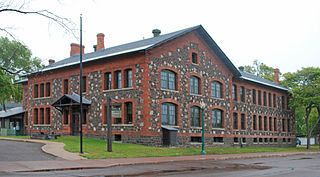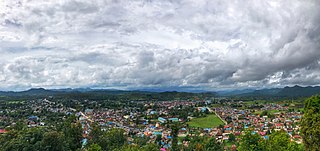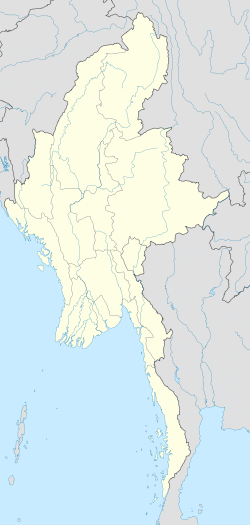
Calumet Township, officially the Charter Township of Calumet, is a charter township of Houghton County in the Upper Peninsula of the U.S. state of Michigan. The population was 6,263 at the 2020 census. Even with a decreasing population, the township remains the largest township by population in Houghton County.

Shan State is a state of Myanmar. Shan State borders China (Yunnan) to the north, Laos to the east, and Thailand to the south, and five administrative divisions of Myanmar in the west. The largest of the 14 administrative divisions by land area, Shan State covers 155,800 km2, almost a quarter of the total area of Myanmar. The state gets its name from Burmese name for the Tai peoples: "Shan people". The Tai (Shan) constitute the majority among several ethnic groups that inhabit the area. Shanland is largely rural, with only three cities of significant size: Lashio, Kengtung, and the capital, Taunggyi. Taunggyi is 150.7 km northeast of the nation's capital Naypyitaw.
A mining accident is an accident that occurs during the process of mining minerals or metals. Thousands of miners die from mining accidents each year, especially from underground coal mining, although accidents also occur in hard rock mining. Coal mining is considered much more hazardous than hard rock mining due to flat-lying rock strata, generally incompetent rock, the presence of methane gas, and coal dust. Most of the deaths these days occur in developing countries, and rural parts of developed countries where safety measures are not practiced as fully. A mining disaster is an incident where there are five or more fatalities.

Maizhokunggar County or Meldro Gungkar County is a county of Lhasa and east of the main center of Chengguan, Tibet Autonomous Region. It has an area of 5,492 square kilometres (2,120 sq mi) with an average elevation of over 4,000 metres (13,000 ft). Most of the people are ethnic Tibetan and are engaged in agriculture or herding. Mining is a major source of tax revenue, but has created environmental problems. The county has various tourist attractions including hot springs and the Drigung Monastery.

Keweenaw National Historical Park is a unit of the U.S. National Park Service. Established in 1992, the park celebrates the life and history of the Keweenaw Peninsula in the Upper Peninsula of the U.S. state of Michigan. It is a federal-local cooperative park made up of two primary units, the Calumet Unit and the Quincy Unit, and almost two dozen cooperating "Heritage Sites" located on federal, state, and privately owned land in and around the Keweenaw Peninsula. The National Park Service owns approximately 1,700 acres (690 ha) in the Calumet and Quincy Units. Units are located in Baraga, Houghton, Keweenaw, and Ontonagon counties.

Mandalay Region is an administrative division of Myanmar. It is located in the center of the country, bordering Sagaing Region and Magway Region to the west, Shan State to the east, and Bago Region and Kayin State to the south. The regional capital is Mandalay. To the south of the region lies the national capital of Naypyidaw. The division consists of eleven districts, which are subdivided into 28 townships and 2,320 wards and village-tracts.

Hpakant is a town in Hpakant Township, Kachin State in the northernmost part of Myanmar (Burma). It is located on the Uyu River 350 km north of Mandalay. It is famous for its jade mines which produce the world's best quality jadeite.

Hsenwi Township, also known as Hseni or Theinni, is a township of Lashio District in the Shan State, Myanmar. It shares the borders with Kutkai Township in the north, Kunlong Township in the east, Lashio Township in the south and Namtu Township in the west. Its area is 1,224.8 square kilometres (472.89 sq mi). There are 4 wards and 32 village-tracts. Total population was about 50,000 in 2009. The principal town is Hsenwi.

Kutkai Township is a township of Muse District in the Shan State of eastern Burma. The principal town is Kutkai.

Kyaukme is a town in northern Shan State of Burma. It is situated on the Mandalay - Lashio road, after Pyin Oo Lwin and Nawnghkio, and before Hsipaw, on what is now the Mandalay - Muse road, part of the Asian Highway route 14 (AH14). It is also connected to Momeik (Mongmit) in the Shweli River valley and Mogok with its ruby mines. Kyaukme can be reached by train on the Mandalay-Lashio railway line. As of 2014, the population was 39,930.

Namtu is a town situated in northern Shan State, Myanmar. It is famous for Bawdwin and Namtu silver mines. NamTu River is flowing across in the middle of town and the transportation from Namtu to Lashio or Namtu to Mandalay is by bus.
Momeik, also known as Mong Mit in Shan, is a town situated on the Shweli River in northern Shan State. It is the principal town of Mongmit Township, Myanmar.
Tagaung is a town in Mandalay Region of Myanmar (Burma). It is situated on the east bank of the Ayeyarwady River, 127 miles north of Mandalay.

Kutkai is a town and seat of Kutkai Township, in the Shan State of eastern-central Burma. It lies along National Highway 3, approximately 24 kilometres to the north of Lashio.
Gwebin is a village in Mogok Township, Pyin Oo Lwin District, in the Mandalay Region of central Burma. It is located 16 miles (26 km) west of Mogok. A track connects it to Shwenyaungbin and Mogok.
The jade trade in Myanmar consists of the mining, distribution, and manufacture of jadeite—a variety of jade—in the nation of Myanmar (Burma). The jadeite deposits found in Myanmar's northern regions are the source of the highest quality jadeite in the world, noted by sources in China going as far back as the 10th century. Chinese culture places significant weight on the meaning of jade; as their influence has grown in Myanmar, so has the jade industry and the practice of exporting the precious mineral.

Panlong Subtownship is a subtownship of the Wa Self-Administered Division of Shan State, formerly and conterminously part of Hopang District.

Burmese amber, also known as Burmite or Kachin amber, is amber from the Hukawng Valley in northern Myanmar. The amber is dated to around 100 million years ago, during the latest Albian to earliest Cenomanian ages of the mid-Cretaceous period. The amber is of significant palaeontological interest due to the diversity of flora and fauna contained as inclusions, particularly arthropods including insects and arachnids but also birds, lizards, snakes, frogs and fragmentary dinosaur remains. The amber has been known and commercially exploited since the first century AD, and has been known to science since the mid-nineteenth century. Research on the deposit has attracted controversy due to its alleged role in funding internal conflict in Myanmar and hazardous working conditions in the mines where it is collected.
Burma Mines, Ltd. or Burma Mines Limited was a British operating firm in Burma which operated one of the largest lead-zinc-silver mines in the world.
Bawdwin Mine is a historical mine in northeast Myanmar which was one of the largest mines controlled by the British Empire before World War II. It was first mined by the ancient Chinese in the 15th century.













